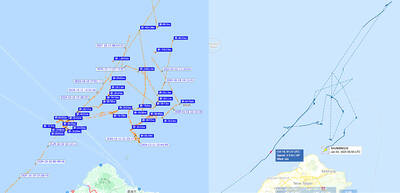The Taipei District Court on Monday ruled in favor of Japanese pornographic film studio MAX-A in an international lawsuit that accused Web site portals in Taiwan and other Taiwanese companies of making profits on films MAX-A produced through unauthorized distribution for online viewing and downloading.
MAX-A filed the lawsuit in 2010 against 12 Taiwanese companies, including Yamedia Inc (天空傳媒), alleging illegal distribution and copyright infringement and seeking compensation of NT$115 million (US$3.75 million).
The decision has been hailed as a landmark, since it is the first time a court in Taiwan backed copyright protection for pornography, with evidence indicating that Taiwanese suppliers and video download service providers signed no deals with MAX-A.
In past judgements, judges have ruled that pornographic films, known as AV (adult video) in Japan and Taiwan, do not warrant copyright protection, saying the materials violate sexual morality, contravene social order and are not in the public’s interest.
Monday’s ruling read: “Copyright law is to protect all forms of human ideas and expressions, and should protect the spirit of creativity. AV products are a manifestation of human civilization, a part of expressed speech and opinions, and therefore are protected under the Constitution.”
“Copyright law protects the intellectual creations by individuals and of their investment. It does not pass judgement on morality, social customs or if the product was good or bad... Therefore AV products are protected under copyright law,” it read.
The accused, Yamedia Inc, a Taiwanese portal best known for its yam.com (蕃薯藤) Web site, said it signed contracts and paid copyright fees to Taiwanese AV suppliers.
Taiwanese AV suppliers said they did not break the law because past judgements ruled that AV products lack copyright protection.
However, despite the ruling, MAX-A will not be able to receive financial compensation, because the court agreed with Taiwanese companies’ claim of not knowing they were breaking the law.
The ruling can be appealed.
MAX-A president Wataru Ishii came to Taiwan to testify.
Ishii said his company’s AV products are all registered with Japanese video industry authorities, each with a registered serial number, and all have copyright protection in Japan.
“We did not authorize AV product distribution to Taiwanese companies, and we have no authorizing mechanism in Taiwan. Therefore, it was not possible for Taiwanese AV suppliers and other companies to receive authorization from us,” Ishii said.

DEEPER REVIEW: After receiving 19 hospital reports of suspected food poisoning, the Taipei Department of Health applied for an epidemiological investigation A buffet restaurant in Taipei’s Xinyi District (信義) is to be fined NT$3 million (US$91,233) after it remained opened despite an order to suspend operations following reports that 32 people had been treated for suspected food poisoning, the Taipei Department of Health said yesterday. The health department said it on Tuesday received reports from hospitals of people who had suspected food poisoning symptoms, including nausea, vomiting, stomach pain and diarrhea, after they ate at an INPARADISE (饗饗) branch in Breeze Xinyi on Sunday and Monday. As more than six people who ate at the restaurant sought medical treatment, the department ordered the

A strong continental cold air mass and abundant moisture bringing snow to mountains 3,000m and higher over the past few days are a reminder that more than 60 years ago Taiwan had an outdoor ski resort that gradually disappeared in part due to climate change. On Oct. 24, 2021, the National Development Council posted a series of photographs on Facebook recounting the days when Taiwan had a ski resort on Hehuanshan (合歡山) in Nantou County. More than 60 years ago, when developing a branch of the Central Cross-Island Highway, the government discovered that Hehuanshan, with an elevation of more than 3,100m,

Taiwan’s population last year shrank further and births continued to decline to a yearly low, the Ministry of the Interior announced today. The ministry published the 2024 population demographics statistics, highlighting record lows in births and bringing attention to Taiwan’s aging population. The nation’s population last year stood at 23,400,220, a decrease of 20,222 individuals compared to 2023. Last year, there were 134,856 births, representing a crude birth rate of 5.76 per 1,000 people, a slight decline from 2023’s 135,571 births and 5.81 crude birth rate. This decrease of 715 births resulted in a new record low per the ministry’s data. Since 2016, which saw

SECURITY: To protect the nation’s Internet cables, the navy should use buoys marking waters within 50m of them as a restricted zone, a former navy squadron commander said A Chinese cargo ship repeatedly intruded into Taiwan’s contiguous and sovereign waters for three months before allegedly damaging an undersea Internet cable off Kaohsiung, a Liberty Times (sister paper of the Taipei Times) investigation revealed. Using publicly available information, the Liberty Times was able to reconstruct the Shunxing-39’s movements near Taiwan since Double Ten National Day last year. Taiwanese officials did not respond to the freighter’s intrusions until Friday last week, when the ship, registered in Cameroon and Tanzania, turned off its automatic identification system shortly before damage was inflicted to a key cable linking Taiwan to the rest of